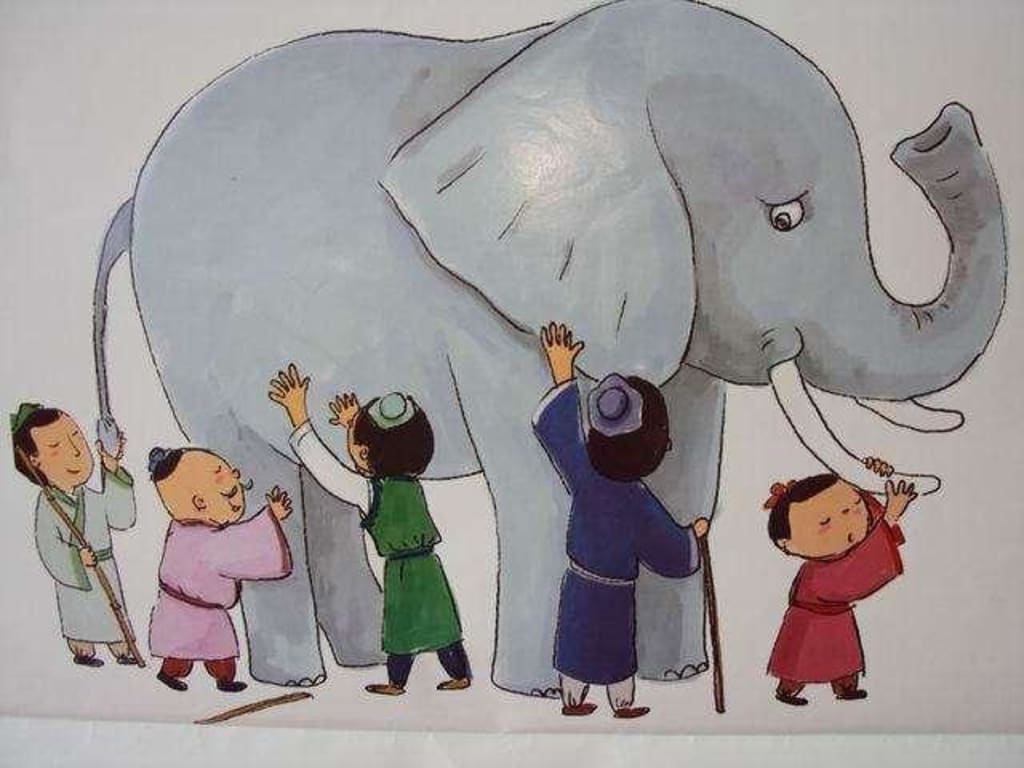
Once upon a time, there were several blind men who heard that a magnificent elephant would be passing through their town. They were very excited to experience the elephant for the first time.
Blind Man 1: "I can't wait to touch the elephant! I wonder what it will feel like."
Blind Man 2: "Yes, me too! I've heard so much about elephants, and I'm eager to know what they look like."
When the elephant finally arrived, the blind men eagerly approached it, each touching a different part of the animal.
Blind Man 1: "Wow, this elephant is like a snake! It's long and thin, and feels like it's moving!"
Blind Man 2: "No, no! You're wrong. The elephant is like a tree, tall and sturdy. I can feel its strong legs."
Blind Man 3: "You're both wrong. The elephant is like a fan. It's flapping its ears and feels light and airy."
The blind men then began to argue with each other about what the elephant looked like.
Blind Man 1: "How can you say the elephant is like a tree? It's clearly like a snake!"
Blind Man 2: "Are you blind? The elephant is like a tree, with a thick trunk and strong legs."
Blind Man 3: "Both of you are wrong. The elephant is like a fan, light and breezy."
A wise man passing by saw the argument and decided to intervene.
Wise Man: "Excuse me, gentlemen. You are all correct, but only partially. The elephant is a large animal with many different parts, and each of you has touched only one part. In order to truly understand what the elephant looks like, you must consider all of its parts together."
Blind Man 1: "Oh, I see now. I was only able to touch the elephant's trunk, so I couldn't know what the rest of the animal looked like."
Blind Man 2: "Yes, I understand now. I only touched the elephant's leg, so I couldn't know what the rest of the animal looked like either."
Blind Man 3: "I see what you mean. I only touched the elephant's ear, so I couldn't know what the rest of the animal looked like."
The blind men then realized that they had been too quick to judge and had not considered the whole picture.
Blind Man 1: "I'm sorry for arguing with you. I should have considered that there were other parts of the elephant I hadn't touched."
Blind Man 2: "Yes, we were all too quick to judge. We need to consider all of the parts of the elephant to truly understand what it looks like."
Blind Man 3: "I agree. We shouldn't jump to conclusions based on just one part of the elephant."
The wise man then reminded them of the importance of being open-minded and considering different perspectives.
Wise Man: "Remember, each of us has a different perspective, and we can learn from each other. It's important to be open-minded and consider different viewpoints in order to gain a more complete understanding of a situation."
The blind men then thanked the wise man for his advice and walked away, wiser and more humble than before. From that day on, they realized the importance of looking at the whole picture and being open-minded in their approach to problem-solving and decision-making.
From the story of the "Blind Men and the Elephant," we can learn several important lessons:
1. We should be open-minded and consider different perspectives. The blind men's argument shows us the danger of being closed-minded and only considering one perspective. By being open to different viewpoints, we can gain a more complete understanding of a situation.
2. We should avoid making judgments or decisions based on limited information. The blind men's understanding of the elephant was limited by the part of the animal they were able to touch. In order to make informed decisions, we need to seek out a more complete picture of the situation.
3. We should be humble in our approach to problem-solving and decision-making. The wise man reminded the blind men that they could learn from each other and that it was important to consider different perspectives. By being humble, we can avoid making hasty judgments and recognize the limitations of our own understanding.
4. We should be willing to learn from others. The blind men learned from the wise man's intervention and realized the importance of considering all parts of the elephant. By being willing to learn from others, we can gain new insights and improve our understanding of a situation.
Overall, the story of the "Blind Men and the Elephant" teaches us to be open-minded, humble, and willing to learn from others. It reminds us of the importance of seeking out a more complete picture before making judgments or decisions, and encourages us to be mindful of our own limitations and biases.
About the Creator
David cen
Share Chinese Sory,which you never heard before.China has 5000 years history and it is A kingdom of artifacts.Such as Chinese Kongfu,Qigong etc.






Comments
There are no comments for this story
Be the first to respond and start the conversation.